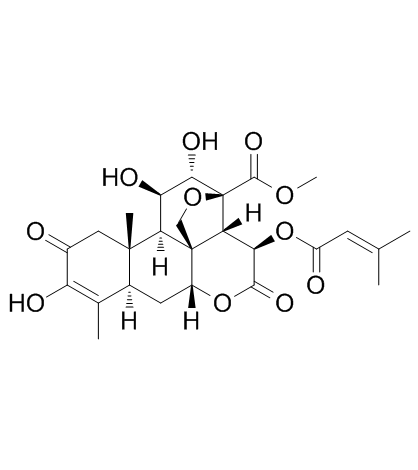Brusatol (NSC 172924) (Synonyms: (+)-Brusatol, NSC 172924) |
| Catalog No.GC34070 |
Brusatol (NSC 172924) (NSC172924) is a unique inhibitor of the Nrf2 pathway that sensitizes a broad spectrum of cancer cells to Cisplatin and other chemotherapeutic agents. Brusatol (NSC 172924) enhances the efficacy of chemotherapy by inhibiting the Nrf2-mediated defense mechanism. Brusatol (NSC 172924) can be developed into an adjuvant chemotherapeutic agent. Brusatol (NSC 172924) increases cellular apoptosis.
Products are for research use only. Not for human use. We do not sell to patients.

Cas No.: 14907-98-3
Sample solution is provided at 25 µL, 10mM.
Brusatol (NSC 172924), isolated from the Brucea javanica plant, inhibits Nrf2.
A potential therapeutic application of an Nrf2 inhibitor such as Brusatol (NSC 172924) is the downregulation of Nrf2 pathway components in cells harboring constitutively high levels of the transcription factor. Brusatol (NSC 172924) provokes the depletion of Nrf2 via a mechanism that is not dependent on Keap1 and the proteasomal and autophagic protein degradation systems. Brusatol (NSC 172924) provokes a rapid and transient depletion of Nrf2 protein, through a posttranscriptional mechanism, in mouse Hepa-1c1c7 hepatoma cells. Brusatol (NSC 172924) also inhibits Nrf2 in freshly isolated primary human hepatocytes[1]. To explore the possible synergistic cytotoxicity of Brusatol (NSC 172924) in combination with CDDP, the study investigates the effects of Brusatol and CDDP cotreatment on CT-26 cell viability using an MTT assay. CT-26 cells are treated with various concentrations of Brusatol (0.05, 0.15, 0.45, 1.35, 4.05 and 12.15 μg/mL) and CDDP (0.05, 0.15, 0.45, 1.35, 4.05 and 12.15 μg/mL) for 48 h, either alone or in combination. Following treatment with Brusatol (NSC 172924) and CDDP for 48 h, the viability of CT-26 cells is reduced in a dose-dependent manner, with IC50 values of 0.27±0.01 and 1.44±0.22 μg/mL, respectively. When Brusatol (NSC 172924) is combined with CDDP at a constant concentration ratio of 1:1, cell growth inhibition is markedly enhanced compared with single-agent treatment; the IC50 value of Brusatol (NSC 172924) and CDDP cotreatment is 0.19±0.02 μg/mL[2].
To explore the anticancer effect of Brusatol in vivo, A549 xenografts grown in nude mice are used as a model. Nude mice are injected with A549 cells to induce tumor growth, followed by a single i.p. injection of 2 mg/kg Brusatol. Tumors are isolated 24 h or 48 h postinjection. Nrf2 protein levels are significantly decreased at 24 h or 48 h postinjection, indicating that Brusatol (NSC 172924) is able to reach the tumor tissue and inhibit the Nrf2 pathway. To measure tumor growth, two different experiments are performed. In the first experiment, once the tumor size reaches an average of 230 mm3, DMSO, Brusatol (NSC 172924) (2 mg/kg), Cisplatin (2 mg/kg), or Cisplatin (2 mg/kg) and Brusatol (2 mg/kg) combined treatment is i.p. injected every other day for a total of five times. Cisplatin or Brusatol (NSC 172924) alone does not inhibit tumor growth significantly, whereas in the combination group, tumor size is significantly reduced[3].
[1]. Olayanju A, et al. Brusatol provokes a rapid and transient inhibition of Nrf2 signaling and sensitizes mammaliancells to chemical toxicity-implications for therapeutic targeting of Nrf2. Free Radic Biol Med. 2015 Jan;78:202-12. [2]. Chen HM, et al. Synergistic antitumor effect of Brusatol combined with Cisplatin on colorectal cancer cells. Int J Mol Med. 2018 Mar;41(3):1447-1454. [3]. Ren D, et al. Brusatol enhances the efficacy of chemotherapy by inhibiting the Nrf2-mediated defense mechanism. Proc Natl Acad Sci U S A. 2011 Jan 25;108(4):1433-8.
Average Rating: 5 (Based on Reviews and 23 reference(s) in Google Scholar.)
GLPBIO products are for RESEARCH USE ONLY. Please make sure your review or question is research based.
Required fields are marked with *




